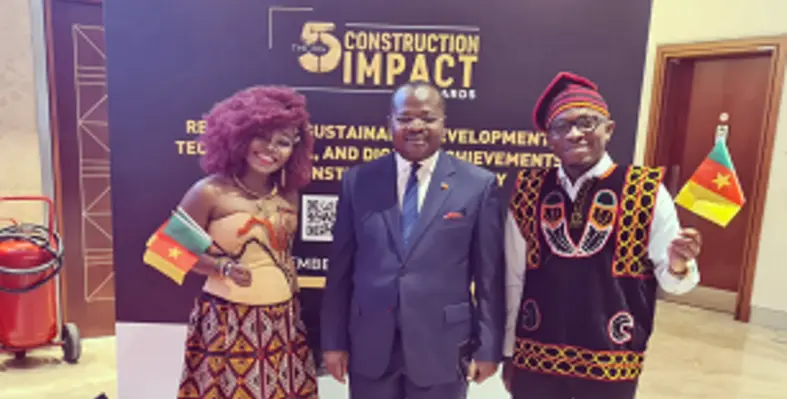After winning multiple awards at The Big 5 Constuction Impact Awards 2022, Ghislaine Tessa Ketcha, CEO of Millenium Group, spoke to African Review to reveal her thoughts after receiving the accolades alongside the lack of female representation in Africa’s construction sector
On 5 December 2022 at Dubai World Trade Centre, UAE, Tessa Ketcha and her company Millenium Group were declared double-winners at The Big 5 Construction Impact Awards – a fiercely contested competition which recognises sustainable development, technology and digital achievements in the construction industry.
Against a formidable selection of nominees – which the judges noted reflected a huge influx of innovation and excellence – Millenium Group’s MINDCA affordable green homes project was exulted as ‘Carbon Net Zero Initiative of the Year’ while Tessa Ketcha herself was named ‘Sustainability Leader of the Year’.
These are remarkable achievements and reflect the hard work the company, and its CEO, have put into finding an alternative way of using construction materials and making Africa a sustainably developed region – as Tessa Ketcha remarked after the show. At times, this hard work has been undertaken in the face of adversity within the construction sector, a notoriously male-dominated sector despite the growing focus on diversity in recent years. Seemingly, however, this has only driven Tessa Ketcha and her colleagues onto new heights and even led her to found Women In Construction Africa, aimed at fostering a valuable support network for women in the industry and ensuring their talent is grown for its betterment.
Speaking to African Review, Tessa Ketcha explained more about her company’s now award- winning environmental initiative and about her drive to change the current narrative around the role of women in Africa’s construction industry.
“Millenium Group is an integrated construction group of companies specialised in infrastructure and civil works, green buildings, eco-friendly affordable housing and sustainable materials production. It is a green one-stop shop which provides urban innovative sustainable and affordable solutions including technology in order to build more liveable and durable cities in Africa.
“We use a systemic approach with adequate engineering work to offer an all-in-one customised service, yet with industrial efficiency, affordability and sustainability. We manufacture and implement structural and sustainable materials; build turnkey projects, mainly eco-friendly; and offer technical assistance. We are mainly active in Cameroon but we have a plan to target other West African countries in 2023.
“The newly added ‘Carbon Net Zero Initiative of the Year’ was awarded to our green homes project named MINDCA – the French acronym for Sustainable Individual Homes On-Demand. It’s an affordable eco-friendly housing concept in kits, available in a variety of models and finishes. Essentially made of soil-blocks with good thermal properties, MINDCA features ecological materials and other sustainable solutions in the areas of insulation, ventilation, and sanitation.
“The homes have reduced carbon footprint, are energy-efficient with operational savings above 40%, and 70% of embodied materials efficiency measured through the EDGE software (a software developed by the World Bank). For each standard two-bedrooms house, around 400 kg of CO2 is saved each year, equivalent to planting ten trees each year throughout lifecycle.
“Receiving the award from peers was a great honour. This was beyond an award. It was also a powerful move in the sense that, not only one, but several meaningful messages and a huge power of representation were embedded: an African female civil engineer and entrepreneur in this male-dominated industry being acknowledged for her contribution in the debate. That representation contributes to shift the narrative towards more inclusive dynamics. It’s a message of courage sent to all those young people and women on the continent who have a lot to offer but whose voices are not heard, including my team, who hardly believed that we could win in front of major players of the industry. For them there was clearly a before and after prize. A sort of increased will and hunger to succeed.”
Read the full interview in the March issue of African Review here.












